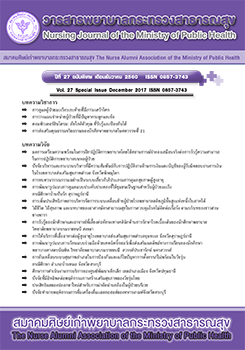Effects of Using Simulation-Based Learning for Preparation of Nursing Practicum on Perceptions of Self Efficacy in Performing Nursing Care in a Hospital.
Main Article Content
Abstract
This quasi-experimental research study aimed to examine the effects of using Simulation-Based Learning for Preparation of Nursing Practicum in a Hospital, to compare the level of perceived self-efficacy of nursing students in performing nursing care before and after the experiment, and to study the level of nursing students’ satisfaction. The sample consisted of 79 sophomore nursing students of Borommarajonnani college of Nursing, Ratchaburi, of the academic year 2014. All subjects received the Simulation-Based Learning for Nursing Practice Preparation. The instruments used for collecting data was a questionnaire with content validity and reliabilities by Cronbach’s alpha coefficientsof .82, and .78. Data analysis involved descriptive statistics including frequency, percentage, standard deviation, and paired t-test. The results were as follows:
- The mean score of perceived self- efficacy of the nursing students after the experiment were significantly higher than that of before the experiment (p< .001);
- Nursing students’ satisfaction with Simulation-Based Learning for nursing practice preparation was at the high level (
=4.05 , SD=.35). The findings suggest that the teachers who teach in this subject should provide nursing students with learn experiences using Simulation-Based Learning for nursing practice preparation so that they can be more confidence and able to provide nursing care to patients in a hospital.
Article Details
บทความและรายงานวิจัยในวารสารพยาบาลกระทรวงสาธารณสุข เป็นความคิดเห็นของ ผู้เขียน มิใช่ของคณะผู้จัดทำ และมิใช่ความรับผิดชอบของสมาคมศิษย์เก่าพยาบาลกระทรวงสาธารณสุข ซึ่งสามารถนำไปอ้างอิงได้
References
2. Jamjang S, Autthamatakul V. Factors influencing the availability of nursing on the wards and the achievement of 2nd years nursing students, Borommarajonnani College of Nursing, Ratchaburi. Praboromarajchanok Institute, Ministry Ministry of Healt. 2010. (in Thai).
3. Jamjang S, Autthamatakul V. The Effect of Readiness Preparation for Nursing Pactice in Ward of 2nd year nursing students. Borommarajonnani College of Nursing,Ratchaburi. Praboromarajchanok Institute, Ministry Ministry of Healt. 2010. (in Thai).
4. Cruickshank, Dan (editor), Erik Gunner Asplund London: Architected Journal, 1988.
5. Khemmani T. Teaching knowledge to the learning process effective.10th ed. Bangkok: Chulalongkorn University Press; 2009. (in Thai).
6. Bandura, A. Self-efficacy: The exercise of control. New York: W.H. Freeman and Company. 1997.
7. Kumkong M, et al. Effects of simulation-based learning on perceived self-efficacy in providing nursing care for advanced life support to patients with critical illness or emergency condition among nursing students. The southern college network journal of nursing and public health. 2016;3(3):52-64.(in Thai).
8. Sinthuchai S, Ubolwan K. Fidelity simulation based learning: implementation to learning. Journal of the royal Thai army nurses. 2017;18(1):29-38.(in Thai).
9. Ratanaprom P, Tanutakit J. Effectiveness of practice preparation for development. Nursing care for normal students. Boromarajonani College of NursingNakhon Si Thammarat. Research Report on Boromarajonani College of Nursing Nakhon Si Thammarat, Ministry of Public Health, 2009.
10. Tharakorn P, Thongpet C. Development model of teaching the situation. Model of emergency care Student Emergency Medical Examinations.

